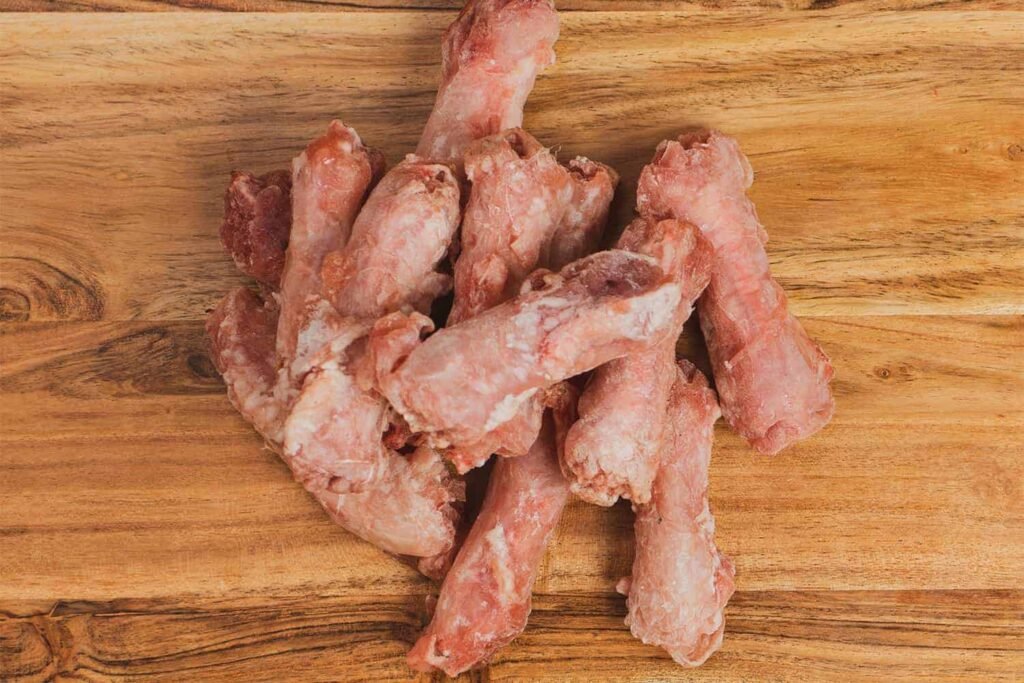Can Dogs Eat Chicken Neck? Is It Good For Them?

If you are a dog owner, you might have wondered if you can feed your furry friend chicken necks raw. After all, they are cheap, easy to find, and seem to be a natural treat for dogs. But are they safe and healthy for your dog? Can dogs eat chicken neck raw?
In this article, we will answer these questions and more, and we will explore the benefits and risks of feeding chicken necks to dogs. With this information, you can make an informed decision about your dog’s diet.
What are Chicken Necks and Why Are They Popular for Dogs?
Chicken necks are exactly what they sound like, the necks of chickens, the part of the chicken that connects the head to the body. They are made up of skin, muscle, cartilage, and bone. They are usually discarded or used to make stock or soup, but some people also feed them to their dogs as a snack or a supplement.
Chicken necks are popular for dogs because they are:
- Cheap: Chicken necks are usually inexpensive and easy to find at grocery stores or butcher shops. You can buy them in bulk and freeze them for later use.
- Natural source of protein: Chicken necks are a natural source of animal protein, calcium, phosphorus, and other nutrients that dogs need. They are also free of additives, preservatives, or artificial ingredients that might harm your dog’s health.
- Chewy: Chicken necks are chewy and crunchy, which can help your dog’s dental health by scraping off plaque and tartar from their teeth. They can also satisfy your dog’s natural instinct to chew and keep them occupied for a while.
Also read, Can Dogs Eat Chicken Feet? Is It Good For Them?
Can Dogs Eat Chicken Necks Raw?
Yes, dogs can safely eat raw chicken necks. They are not only delicious but also an excellent source of nutrients like protein and calcium that can benefit your dog’s health.
Regularly incorporating chicken necks into your furry friend’s diet can help promote their well-being and maintain their health. Just remember to always supervise your dog while they are eating to prevent any choking hazards or other potential risks.

How to Safely Feed Raw Chicken Necks to Dogs
To safely feed your dogs raw chicken necks follow use the tips below;
- Choose high-quality chicken necks from a reputable source.
- Thaw the chicken necks thoroughly in the refrigerator or under cold water.
- Wash your hands and any utensils or surfaces that come into contact with the raw chicken.
- Supervise your dog while they are eating to prevent choking and other potential risks.
- Offer the chicken necks as a treat or supplement to your dog’s regular diet, rather than as a meal replacement.
- Store any leftover chicken necks in an airtight container in the refrigerator or freezer.
Nutritional Benefits of Raw Chicken Necks for Dogs
Raw chicken necks can provide some nutritional benefits for your dog, such as:
- Protein: This is essential for your dog’s growth, development, and maintenance of muscles, organs, skin, hair, nails, and immune system. Protein also provides energy and helps your dog feel full and satisfied.
- Calcium: Chicken necks are rich in calcium, which is important for your dog’s bone health, teeth strength, nerve function, muscle contraction, blood clotting, and hormone secretion. Calcium also helps prevent osteoporosis and other bone diseases in older dogs.
- Phosphorus: Chicken necks also contain phosphorus, which works together with calcium to form strong bones and teeth. Phosphorus also helps regulate the pH balance of your dog’s body fluids and supports the metabolism of carbohydrates, fats, and proteins.
- Other vitamins and minerals: Chicken necks also provide other vitamins and minerals your dog needs, such as vitamin A, vitamin B complex, iron, zinc, copper, selenium, and magnesium. These nutrients support various functions of your dog’s body, such as vision, skin health, blood formation, immune system, antioxidant defense, and enzyme activity.
Risks and Disadvantages of Feeding Raw Chicken Necks to Dogs
Even though dogs can eat chicken necks raw, there are some risks you need to be aware of. These include:
- Can cause choking hazard: Chicken necks can pose a choking hazard for some dogs, especially if they swallow them whole or in large pieces. This can cause obstruction or damage to your dog’s throat or digestive tract. To prevent this from happening, you should always supervise your dog when they eat chicken necks and make sure they chew them properly. You should also avoid giving chicken necks to puppies, small dogs, or dogs with dental problems or difficulty swallowing.
- Risk of bacterial infections: Chicken necks can harbor harmful bacteria such as salmonella or campylobacter that can cause food poisoning or diarrhea in your dog. These bacteria can also be transmitted to you or other people who come in contact with your dog or their feces. To reduce this risk, you should always wash your hands before and after handling chicken necks and keep them refrigerated or frozen until ready to use. You should also discard any leftover chicken necks after 24 hours and clean your dog’s bowl and feeding area thoroughly.
- May lead to nutritional imbalances: Chicken necks are not a complete or balanced diet for your dog. They are high in protein and calcium but low in other nutrients such as fat, fiber, carbohydrates, vitamin D, vitamin E, and omega-3 fatty acids. If you feed your dog too many chicken necks or rely on them as their main food source, you might cause nutritional imbalances or deficiencies in your dog. This can lead to health problems such as obesity, kidney stones, rickets, or pancreatitis. To avoid this, you should only feed your dog chicken necks as an occasional treat or a supplement to their regular diet. You should also consult your veterinarian about the appropriate amount and frequency of feeding chicken necks to your
- Can cause severe paralysis: Even though chicken necks are a common treat for dogs, researchers from the University of Melbourne warn pet owners to avoid giving raw chicken necks to dogs because they increase the chances of causing a severe paralysis called acute polyradiculoneuritis (APN) by more than 70 times. Read more here.
Can Dogs Eat Cooked Chicken Necks?
Yes, dogs can safely eat cooked chicken necks. However, the best way to cook chicken necks for dogs is by using a slow cook or pressure pot. These methods of cooking make the bones soft and crumbly so that they are safe for your dog to eat.
Besides that, cooking chicken necks thoroughly can help to reduce the risk of bacteria that can make your furry friend sick.
It’s important to note that cooked bones easily splinter and can injure your dog’s mouth, hence you must ensure that the chicken necks are fully cooked to prevent the risk of choking or other potential hazards.
Additionally, feeding too many cooked chicken necks to your dog on a regular basis can lead to an unbalanced diet. Hence, it’s best to offer them in moderation as a supplement to your dog’s regular meals.
Dehydrated Chicken Necks for Dogs
Dehydrated chicken necks can make a tasty and nutritious treat for dogs. Dehydration removes most of the moisture from the chicken necks, which can help to preserve them and prolong their shelf life without the need for any artificial preservatives.
Dehydrated chicken necks are also lower in fat and calories than their fresh or cooked counterparts, making them a healthier option for dogs who are watching their weight.
To dehydrate chicken necks for dogs at home, start by thoroughly cleaning and drying the necks, then arrange them on a dehydrator tray and dry them at a low temperature for several hours.
If you are shopping for it, it’s important to ensure that the dehydrated chicken necks are sourced from a reputable supplier and that they are fully dried and free from any contaminants or harmful additives.
Additionally, as with any treat, it’s best to offer dehydrated chicken necks to your dog in moderation as part of a balanced diet.

Feeding Chicken Necks to Puppies: Is Raw Chicken Necks Good for Puppies?
While chicken necks can be a healthy and nutritious addition to a dog’s diet, it’s important to exercise caution when feeding them to puppies. Puppies have developing teeth and jaws that may not be strong enough to handle the bones in chicken necks, which could pose a choking hazard or cause injury to the puppy’s mouth or throat.
Additionally, feeding chicken necks or other bones to puppies can increase the risk of intestinal blockages or other digestive issues. It’s best to consult with a veterinarian before introducing chicken necks or any other new food to a puppy’s diet, to ensure that it’s safe and appropriate for their age and stage of development.
Age to introduce chicken necks
The appropriate age to introduce chicken necks or any other bones to puppies can vary depending on the breed and size of the puppy, as well as their individual development. In general, it’s best to wait until a puppy is at least 4-6 months old and their adult teeth have fully developed before introducing any bones into their diet.
However, it’s always a good idea to consult with a veterinarian before introducing any new foods or treats to a puppy’s diet, to ensure that it’s safe and appropriate for their individual needs.
How Many Chicken Necks Should I Give to My Dog?
The appropriate amount of chicken necks to feed your dog depends on factors such as size, weight, age, and activity level. For small to medium-sized dogs, one chicken neck per day is sufficient, while larger dogs can have two per day.
It’s crucial to observe your dog’s weight and adjust the serving size as needed to ensure they maintain a healthy weight. Gradually introduce chicken necks into their diet to prevent digestive issues. As always, consult with a veterinarian before making significant changes to your dog’s diet.
Where to Buy Chicken Necks for Dogs
Chicken necks for dogs can be bought from pet stores or online retailers that specialize in pet supplies. They might also be available at local farms or butchers. It’s important to purchase from a trustworthy supplier that sources their products from high-quality, human-grade ingredients.
When purchasing chicken necks, read the label carefully to make sure they are free from harmful additives or preservatives that can harm your dog’s health.
Alternatives to Chicken Necks for Dogs
Turkey, beef marrow, lamb, pork, duck necks, rabbit ears, and fish are great alternatives to chicken necks for dogs. They all provide essential nutrients and protein.
Beef marrow bones are a source of vitamins and minerals. Lamb neck bones are ideal for dogs with allergies to chicken or beef. Care should be taken with pork neck bones to avoid choking hazards. Duck necks are a flavorful source of nutrients. Rabbit ears are a low-fat and crunchy snack that dogs enjoy. Certain fish, like salmon, are packed with omega-3 and essential nutrients for dogs.
Conclusion
In conclusion, dogs can eat chicken necks, but in moderation and with proper precautions. Chicken necks are rich in protein, calcium, and other essential nutrients, but there are also potential risks such as choking, gastrointestinal obstruction, and bacterial contamination.
It’s crucial to consider your dog’s individual needs and health status before feeding them chicken necks, as with any food. Seeking the advice of a veterinarian can help ensure that your dog’s diet is balanced and appropriate.
As responsible pet owners, we must pay attention to what we feed our dogs. While chicken necks can be a tasty and nutritious snack, they should only be a small part of our dog’s overall diet. By staying informed and responsible about our dog’s diet, we can ensure their long-term health and happiness.





